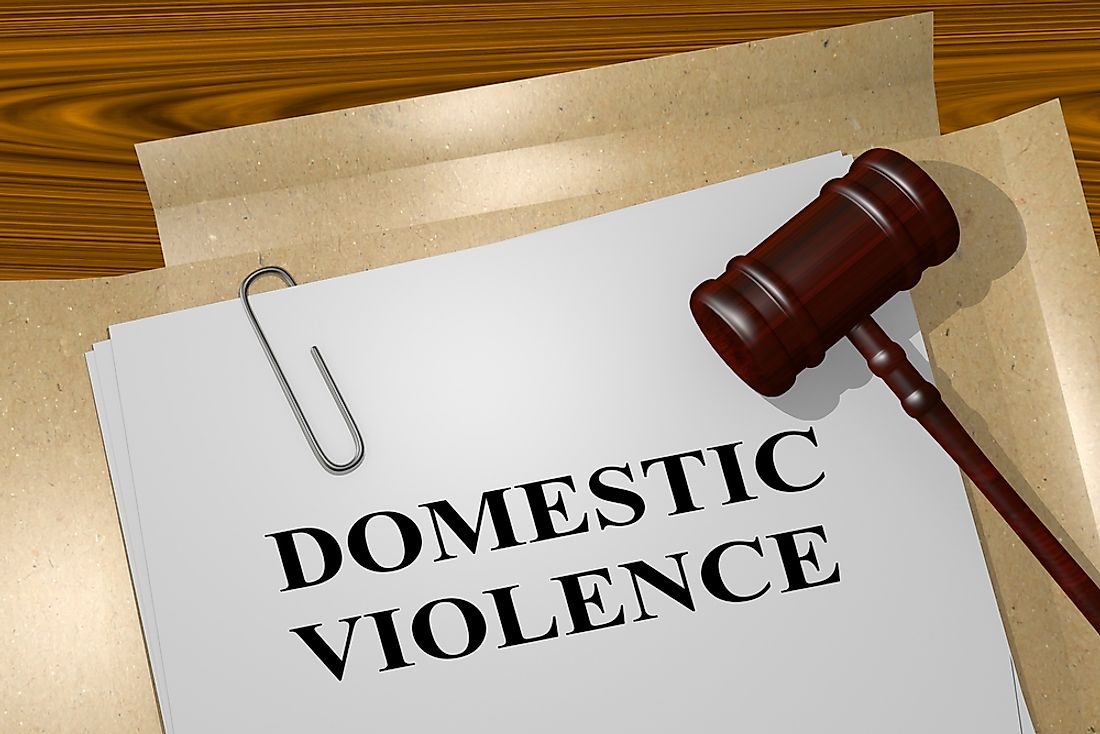Countries Without Laws Against Domestic Violence

Domestic violence is one of the primary causes of injuries, single parenthood, depression, and even death in most societies today. Domestic violence is an aggressive or violent behavior including an emotional abuse used by one or more people in a relationship to control the other and affects their physical or mental health. Domestic violence is particularly common between spouses or intimate partners. Unfortunately, even in the 21st century, many countries lack laws to tackle domestic violence or cruel inhuman and degrading treatment. Such countries experience some domestic violence as high as more than 300 cases daily.
Cultural factors contributing to lack of legislations on domestic violence
Factors such as cultural mores, religious beliefs, and taboos are some of the leading causes of lack of legislation on domestic violence in most countries. Most cultures claim to have unwritten laws of handling domestic violence and as such the people do not believe there is a need for a law on domestic violence. These laws vary from one community to another leading to a lack of a common or universal law on domestic violence in the majority of countries. In the developing world, there are symbols of authority tasked with the responsibility of handling domestic violence cases in the community. They could include village elders, religious leaders, chiefs or clan heads. These authorities continue to oppose any attempt by the governments to introduce any legal framework on handling domestic violence. In countries of the Middle East and elsewhere, it is a taboo for women to report any form of violence meted against them. Lack of reported cases makes it difficult to enact legislation on domestic violence because of inadequate support from local communities.
Legal factors contributing to absence of legislation on domestic violence
Most of the offices and institutions responsible for legislations like parliament are dominated by men. Laws and legislations on domestic violence are thus frustrated and rejected by men who feel the law on domestic violence is a punishment targeted at men. Legislations on domestic violence have been seen as an infringement on the rights of the person who has committed the crime, particularly when punishment for the offense is involved. In some countries, domestic violence is not seen as a crime and therefore do not see the need for any “special” legislation for such actions.
Implication of lack of legislation on domestic violence
Both legal and cultural factors have contributed significantly to the lack of defined domestic violence laws with most countries relying on existing legislation to handle and prosecute cases. Most of these statutes have adequate loopholes for the accused to evade justice especially when the victim is at their mercy. The rising cases of domestic violence are alarming because there is no proper defined framework or legislation of dealing with such violence. People confidently commit this type of crime knowing that they will get away with it. Besides, the village authorities who handle domestic cases are easily compromised to give a verdict that favors the accused and therefore denying justice to the victim.
Countries Lacking Regulations
Some of the countries with no defined legislation on domestic violence in Africa include the DRC, South Sudan, Republic of Congo, Ivory Coast, Chad, Swaziland, Burkina Faso, Cameroun, Morocco, Guinea, Gabon, and Eritrea among others. The Middle East countries that do not have legislation on domestic violence include Iraq, Iran, Myanmar, Qatar, Haiti, Oman, Syria, Palestine, Yemen, and Armenia.
Nations Without Domestic Violence Regulation
| Country | Legislation exists on domestic violence? |
| DR Congo | No |
| South Sudan | No |
| Republic of the Congo | No |
| Iraq | No |
| Iran | No |
| Ivory Coast | No |
| Myanmar | No |
| Chad | No |
| Swaziland | No |
| Burkina Faso | No |
| Cameroon | No |
| Morocco | No |
| Guinea | No |
| Estonia | No |
| Russia | No |
| Qatar | No |
| Gabon | No |
| Eritrea | No |
| Equatorial Guinea | No |
| Djibouti | No |
| Niger | No |
| Haiti | No |
| Egypt | No |
| Oman | No |
| Syria | No |
| Sudan | No |
| United Arab Emirates | No |
| Bahrain | No |
| Afghanistan | No |
| Mauritania | No |
| Yemen | No |
| Palestine | No |
| Uzbekistan | No |
| Armenia | No |
| Mali | No |
| Liberia | No |
| Lesotho | No |
| Libya | No |
| Tunisia | No |
| Togo | No |
| Micronesia | No |
| Algeria | No |
| Tanzania | No |
| Kenya | No |
| Kuwait | No |











